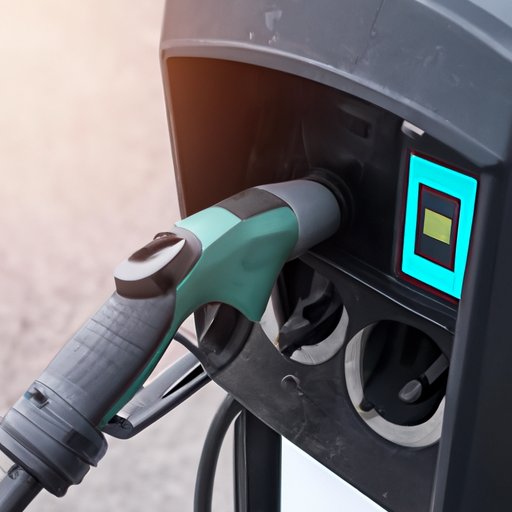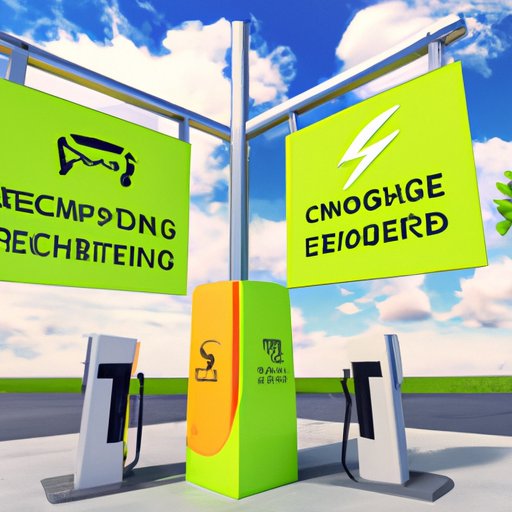
I. Introduction
Electric vehicles (EVs) have become increasingly popular in recent years. However, one question that often comes up is whether or not you have to pay for EV charging stations. It’s important to understand the costs associated with charging an EV to avoid unexpected charges and range anxiety. This article will explore the different types of charging stations, their costs, and the misconceptions around free EV charging.
II. The Lowdown: Are EV Charging Stations Really Free?
One common misconception is that all EV charging stations are free. However, while some charging stations are free, there are costs involved in charging an EV, including electricity, equipment, and maintenance costs. The actual cost of charging depends on the type of charging station and the company that operates it.
There are three types of EV charging stations: Level 1, Level 2, and DC fast charging. Level 1 charging stations use a standard household outlet and can take up to 22 hours to fully charge an EV. Level 2 charging stations use a 240-volt outlet and can fully charge an EV in 4-10 hours. DC fast charging stations use direct current to quickly charge an EV in 30 minutes or less.
III. Navigating the Costs of EV Charging Stations
The cost of charging an EV involves several factors, including the price of electricity, the pricing model used by the charging station, and any network or membership fees. Some charging stations charge by the hour, while others charge per kWh. Public charging stations may also charge a start-up fee or a flat fee per session.
While charging at home is generally cheaper than using public charging stations, it’s important to consider that installing a Level 2 charging station at home can cost $500-$1,500, not including the cost of electricity. However, some states offer incentives and tax credits for home EV charging station installation.
IV. The Truth About Free EV Charging: Analyzing the Fine Print
Many charging stations offer free charging, but it’s important to read the fine print. Some may offer free charging for a limited time or only at certain times of the day. Other stations may require a membership or loyalty program to access free charging. Additionally, some free charging stations may have limited availability or time restrictions.

V. Advantages and Disadvantages of Free EV Charging Stations
While free EV charging may seem like a great deal, it can have its drawbacks. Limited availability or long wait times for free charging can contribute to range anxiety. Paid charging stations may offer faster charging speeds and more reliable availability. However, free charging stations can also be a good option for occasional or emergency use, especially for those who don’t have access to a home charging station.
VI. How to Find the Best Free EV Charging Stations Near You
There are several tools and apps available to help locate EV charging stations in your area, including Plugshare and Chargepoint. These apps can also filter charging stations by cost and type. It’s important to plan out your charging needs in advance to avoid running out of battery during long trips or daily commutes.
VII. EV Charging Stations 101: Understanding Your Charging Options
It’s important to understand the different types of charging options available to EV drivers. Level 1 charging stations are the most basic and use a standard household outlet. Level 2 charging stations are faster, but require installation of a 240-volt outlet. DC fast charging stations are the quickest option, but also the most expensive. It’s also important to note that not all EVs are compatible with all charging stations.
VIII. Examining the Costs and Benefits of EV Ownership for Drivers: A Look into the Future of Charging Stations
The future of EV charging stations looks promising. With advancements in technology and infrastructure, charging times will continue to decrease and charging station availability will increase. While the initial cost of EV ownership may be higher, long-term savings on fuel and maintenance costs can make EVs a cost-effective option for drivers.
IX. Conclusion
In conclusion, while some EV charging stations are free, it’s important to understand the costs associated with charging your EV. The costs of charging depend on the type of charging station, pricing model, and any network or membership fees. Free charging stations can be a good option for occasional or emergency use, but it’s important to plan out your charging needs in advance. With advancements in technology and infrastructure, EVs are becoming a cost-effective and eco-friendly option for drivers. Understanding the costs and benefits associated with owning an EV can help you make an informed decision.





